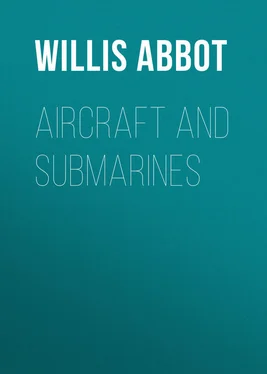Willis Abbot - Aircraft and Submarines
Здесь есть возможность читать онлайн «Willis Abbot - Aircraft and Submarines» — ознакомительный отрывок электронной книги совершенно бесплатно, а после прочтения отрывка купить полную версию. В некоторых случаях можно слушать аудио, скачать через торрент в формате fb2 и присутствует краткое содержание. Жанр: foreign_antique, foreign_prose, на английском языке. Описание произведения, (предисловие) а так же отзывы посетителей доступны на портале библиотеки ЛибКат.
- Название:Aircraft and Submarines
- Автор:
- Жанр:
- Год:неизвестен
- ISBN:нет данных
- Рейтинг книги:4 / 5. Голосов: 1
-
Избранное:Добавить в избранное
- Отзывы:
-
Ваша оценка:
- 80
- 1
- 2
- 3
- 4
- 5
Aircraft and Submarines: краткое содержание, описание и аннотация
Предлагаем к чтению аннотацию, описание, краткое содержание или предисловие (зависит от того, что написал сам автор книги «Aircraft and Submarines»). Если вы не нашли необходимую информацию о книге — напишите в комментариях, мы постараемся отыскать её.
Aircraft and Submarines — читать онлайн ознакомительный отрывок
Ниже представлен текст книги, разбитый по страницам. Система сохранения места последней прочитанной страницы, позволяет с удобством читать онлайн бесплатно книгу «Aircraft and Submarines», без необходимости каждый раз заново искать на чём Вы остановились. Поставьте закладку, и сможете в любой момент перейти на страницу, на которой закончили чтение.
Интервал:
Закладка:
The submarine has exerted upon the progress of the war an influence even more dominant than that of aircraft. It has been a positive force both offensive and defensive. It has been Germany's only potent weapon for bringing home to the British the privations and want which war entails upon a civilian population, and at the same time guarding the German people from the fullest result of the British blockade. It is no overstatement to declare that but for the German submarines the war would have ended in the victory of the Allies in 1916.
We may hark back to our own Civil War for an illustration of the crushing power of a superior navy not qualified by any serviceable weapon in the hands of the weaker power.
Historians have very generally failed to ascribe to the Federal blockade of Confederate ports its proportionate influence on the outcome of that war. The Confederates had no navy. Their few naval vessels were mere commerce destroyers, fleeing the ships of the United States navy and preying upon unarmed merchantmen. With what was rapidly developed into the most powerful navy the world had ever seen, the United States Government from the very beginning of the war locked the Confederate States in a wall of iron. None might pass going in or out, except by stealth and at the peril of property and life. Outside the harbour of every seaport in the control of the Confederates the blockading men-of-war lurked awaiting the blockade runners. Their vigilance was often eluded, of course, yet nevertheless the number of cargoes that slipped through was painfully inadequate to meet the needs of the fenced-in States. Clothing, medicines, articles of necessary household use were denied to civilians. Cannon, rifles, saltpetre, and other munitions of war were withheld from the Confederate armies. While the ports of the North were bustling with foreign trade, grass grew on the cobble-stoned streets along the waterfronts of Charleston and Savannah. Slow starvation aided the constant pounding of the Northern armies in reducing the South to subjection.
Had the Confederacy possessed but a few submarines of modern type this situation could not have persisted. Then, as to-day, neutral nations were eager to trade with both belligerents. There were then more neutrals whose interests would have compelled the observance of the laws of blockade, which in the present war are flagrantly violated by all belligerents with impunity. A submarine raid which would have sunk or driven away the blockading fleet at the entrance to a single harbour would have resulted in opening that harbour to the unrestricted uses of neutral ships until the blockade could be re-established and formal notice given to all powers – a formality which in those days, prior to the existence of cables, would have entailed weeks, perhaps months, of delay.
How serious such an interruption to the blockade was then considered was shown by the trepidation of the Union naval authorities over the first victories of the Merrimac prior to the providential arrival of the Monitor in Hampton Roads. It was then thought that the Confederate ram would go straight to Wilmington, Charleston, and Savannah, destroy or drive away the blockaders, and open the Confederacy to the trade of the world.
Even then men dreamed of submarines, as indeed they have since the days of the American Revolution. Of the slow development of that engine of war to its present effectiveness we shall speak more fully in later chapters. Enough now to say that had the Confederacy possessed boats of the U-53 type the story of our Civil War might have had a different ending. The device which the Allies have adopted to-day of blockading a port or ports by posting their ships several hundred miles away would have found no toleration among neutrals none too friendly to the United States, and vastly stronger in proportion to the power of this nation than all the neutrals to-day are to the strength of the Allies.
From the beginning of the Great War in Europe the fleets of the Teutonic alliance were locked up in port by the superior floating forces of the Entente. Such sporadic dashes into the arena of conflict as the one made by the German High Fleet, bringing on the Battle of Jutland, had but little bearing on the progress of the war. But the steady, persistent malignant activity of the German submarines had everything to do with it. They mitigated the rigidity of the British blockade by keeping the blockaders far from the ports they sought to seal. They preyed on the British fleets by sinking dreadnoughts, battleships, and cruisers in nearly all of the belligerent seas. If the British navy justified its costly power by keeping the German fleet practically imprisoned in its fortified harbours, the German submarines no less won credit and glory by keeping even that overwhelming naval force restricted in its movements, ever on guard, ever in a certain sense on the defensive. And meanwhile these underwater craft so preyed upon British foodships that in the days of the greatest submarine activity England was reduced to husbanding her stores of food with almost as great thrift and by precisely the same methods as did Germany suffering from the British blockade.
Aircraft and submarines! Twin terrors of the world's greatest war! The development, though by no means the final development, of dreams that men of many nations have dreamed throughout the centuries! They are two of the outstanding features of the war; two of its legacies to mankind. How much the legacy may be worth in peaceful times is yet to be determined. The airplane and the dirigible at any rate seem already to promise useful service to peaceful man. Already the flier is almost as common a spectacle in certain sections of our country as the automobile was fifteen years ago. The submarine, for economic reasons, promises less for the future in the way of peaceful service, notwithstanding the exploits of the Deutschland in the ocean-carrying trade. But perhaps it too will find its place in industry when awakened man shall be willing to spend as much treasure, as much genius, as much intelligent effort, and as much heroic self-sacrifice in organizing for the social good as in the last four years he has expended in its destruction.
CHAPTER II
THE EARLIEST FLYING MEN
The conquest of the air has been the dream of mankind for uncounted centuries. As far back as we have historic records we find stories of the attempts of men to fly. The earliest Greek mythology is full of aeronautical legends, and the disaster which befell Icarus and his wings of wax when exposed to the glare of the midsummer sun in Greece, is part of the schoolboy's task in Ovid. We find like traditions in the legendary lore of the Peruvians, the East Indians, the Babylonians, even the savage races of darkest Africa. In the Hebrew scriptures the chief badge of sanctity conferred on God's angels was wings, and the ability to fly. If we come down to the mythology of more recent times we find our pious ancestors in New England thoroughly convinced that the witches they flogged and hanged were perfectly able to navigate the air on a broomstick – thus antedating the Wrights' experiments with heavier-than-air machines by more than 250 years.
It is an interesting fact, stimulating to philosophical reflection, that in the last decade more has been done toward the conquest of the air, than in the twenty centuries preceding it, though during all that period men had been dreaming, planning, and experimenting upon contrivances for flight. Moreover when success came – or such measure of success as has been won – it came by the application of an entirely novel principle hardly dreamed of before the nineteenth century.
Some of the earlier efforts to master gravity and navigate the air are worthy of brief mention if only to show how persistent were the efforts from the earliest historic ages to accomplish this end. Passing over the legends of the time of mythology we find that many-sided genius, Leonardo da Vinci, early in the sixteenth century, not content with being a painter, architect, sculptor, engineer and designer of forts, offering drawings and specifications of wings which, fitted to men, he thought would enable them to fly. The sketches are still preserved in a museum at Paris. He modelled his wings on those of a bat and worked them with ropes passing over pulleys, the aviator lying prone, face downward, and kicking with both arms and legs with the vigour of a frog. There is, unhappily, no record that the proposition ever advanced beyond the literary stage – certainly none that Da Vinci himself thus risked his life. History records no one who kicked his way aloft with the Da Vinci device. But the manuscript which the projector left shows that he recognized the modern aviator's maxim, "There's safety in altitude." He says, in somewhat confused diction:
Читать дальшеИнтервал:
Закладка:
Похожие книги на «Aircraft and Submarines»
Представляем Вашему вниманию похожие книги на «Aircraft and Submarines» списком для выбора. Мы отобрали схожую по названию и смыслу литературу в надежде предоставить читателям больше вариантов отыскать новые, интересные, ещё непрочитанные произведения.
Обсуждение, отзывы о книге «Aircraft and Submarines» и просто собственные мнения читателей. Оставьте ваши комментарии, напишите, что Вы думаете о произведении, его смысле или главных героях. Укажите что конкретно понравилось, а что нет, и почему Вы так считаете.












